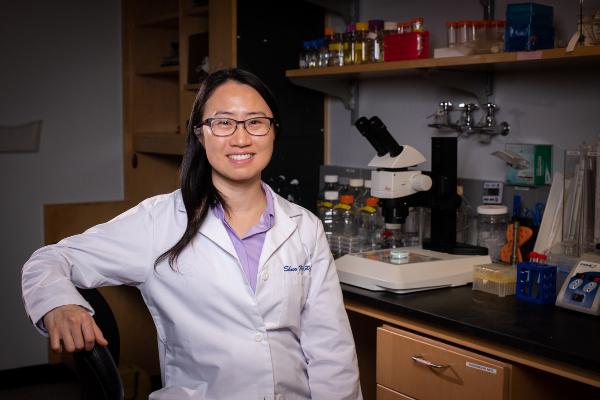
A bustling metropolis of bacteria lives in our guts, and the chemical compounds they produce may influence how we age. Duke Science and Technology Scholar Shuo Han, PhD, assistant professor of biochemistry, is building tools to decode this hidden world — and uncover ways to postpone age-related decline.
“A subset of these molecules are absorbed into the blood and have the potential to interact with different tissues and organs such as the heart and the brain,” she said. “By better understanding the functions and mechanisms of how these gut bacteria species work to our benefit, we can translate this knowledge to improve age-associated decline in gastrointestinal and systemic health.”
Because gut bacteria thrive in low-oxygen environments, they produce thousands of hard-to-identify compounds. Studying them requires expertise in metabolomics (the study of a large collection of metabolic byproducts present within a cell, tissue, or organism). This expertise is often lacking in academic labs, Han said.
Since she joined the Duke University faculty in September 2022, Han’s lab, including Duke biochemistry graduate student Yuxin Li, has stepped up with a powerful new tool: a gut microbiome-focused metabolomics protocol that’s freely available to researchers.
Published in Nature Protocols, the tool provides sample preparation methods, bioinformatics pipelines, and a mass spectrometry reference library accurately detecting more than 800 metabolites across different instruments. Other collaborators on the protocol were Justin Sonnenburg and Emma Guiberson from Stanford University. “This protocol democratizes microbiome metabolomics for users, accelerating our chemical understanding of the gut microbiome,” Han said.
Han’s lab is also using well-established models of aging, such as the nematode worm C. elegans and mice, to identify and study gut bacteria species and their metabolites that affect host aging physiology. “We aspire to decipher the chemical language of human gut bacteria in host health and longevity,” Han said.
Han said she believes that doing great research must be self-driven, so she gives her trainees freedom to lead their projects and see where their hypotheses take them. “Making scientific discoveries is a tough job, but it can be incredibly rewarding,” she said. “My role is to keep students motivated during the challenging times and provide the timely guidance and vision to steer their research toward productive goals.”